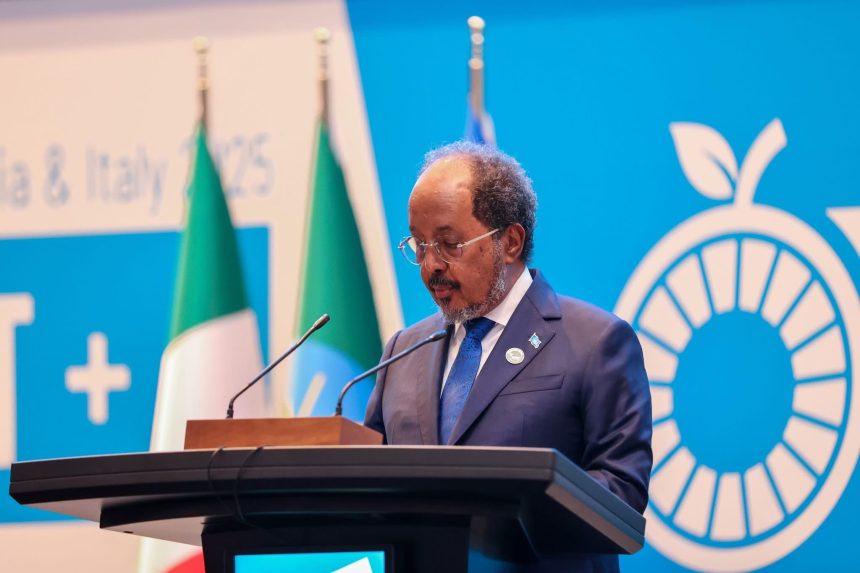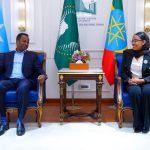Addis Ababa, Ethiopia | 28–29 July 2025
Your Excellency Dr. Abiy Ahmed, Prime Minister of the Federal Democratic Republic of Ethiopia,
Your Excellency Giorgia Meloni, Prime Minister of the Italian Republic,
Her Excellency Ms. Amina Mohammed, Deputy Secretary-General of the United Nations,
Your Excellencies, Heads of State and Government, Ladies and Gentlemen,
It is a great honour to address this distinguished Summit at a time the world stands at a crossroads, facing converging crises and unprecedented demands on our food systems.
This gathering is not only timely, but essential. We are summoned here not merely to reflect, but to renew our shared commitment to building sustainable, resilient, and inclusive food systems for all.
As we grapple with overlapping global crises, armed conflicts, climate shocks, food insecurity, and widening economic disparities, the urgency of transforming how we produce, distribute, and consume food has never been more pressing.
For the Federal Republic of Somalia, agriculture is more than a sector, it is the lifeblood of our society, our culture, and our survival. It contributes over 70% to our GDP , employs nearly 80% of our population, and generates 85% of our export earnings.
Despite enduring over three decades of socio-economic upheaval and environmental shocks, Somalia’s farmers, pastoralists, and fisher communities have demonstrated extraordinary resilience and fortitude in feeding the nation.
In Somalia, livestock is not only a major pillar of our agricultural economy but also a critical driver of food security, demonstrating the strong link between crop production, animal husbandry, and the resilience of rural livelihoods.
Today, Somalia is charting a new course. Through the National Transformation Plan (NTP), we have identified agriculture as the engine of inclusive economic growth, social cohesion, and national recovery. The NTP is a bold, yet pragmatic roadmap that prioritizes private sector led growth, public-private partnerships, and comprehensive value chain reform. Under our productive sector ministries, we are enacting policies and programmes that promote climate resilience, strengthen rural livelihoods, and connect our producers to both domestic and export markets.
Our commitment to ending poverty and hunger is unwavering. In a country where nearly half of the population lives in rural areas, and over 4 million people face acute food insecurity, transforming agriculture is not a choice, it is a moral obligation and a national necessity. Our newly launched Agricultural Transformation Strategy outlines concrete priorities for governance, productivity, infrastructure, agri-business, and institutional capacity-building.
We believe agriculture must not only feed our people, it must create jobs, foster peace, and prepare Somalia for the future. Our journey is anchored in global solidarity and regional integration. Somalia was an early endorser of the COP28 Declaration on Sustainable Agriculture, Resilient Food Systems, and Climate Action.
We have revised our Nationally Determined Contributions (NDCs) to reflect climate-smart agricultural priorities and have strengthened our water resource management and early warning systems. Somalia remains committed to the 2030 Agenda for Sustainable Development, ensuring no one is left behind.
We are in the process of actively implementing flagship policies such as the Environmental Management Bill, the Great Green Wall Initiative, and the Green Somalia Campaign, which advance ecosystem restoration and landscape resilience. These global frameworks are being localized and operationalized through national task-forces dedicated to climate adaptation, sustainable food systems, and rural development.
At the regional level, Somalia is reinforcing its commitments under the Kampala Declaration on CAADP and the Africa Climate Summit outcomes. Our accession to the East African Community, and our observer status with COMESA and AfCFTA, reflect Somalia’s clear intent to harmonize agricultural policies, expand intra-African trade, and become a competitive actor in regional food systems.
Institutionally, Somalia is reclaiming its place in the global community. With the successful completion of the HIPC debt relief process, we have regained fiscal space and international credibility to attract long-term investment. My administration remains firmly committed to rebuilding state institutions, decentralizing services, and entrenching inclusive governance.
Excellencies, Ladies and Gentlemen,
While our progress is real, our challenges remain formidable. Poverty is still widespread, food insecurity persists, and climate shocks continue to test our resilience. Like many nations emerging from fragility, Somalia cannot walk this path alone. We therefore call for strengthened international solidarity and equitable access to climate finance, innovation, and technical assistance.
Somalia stands ready to partner with development banks, UN agencies, private investors, and regional institutions to accelerate transformative action. In particular, we welcome collaboration around digital agriculture, agro-logistics, climate adaptation, and cross-border trade corridors that will unlock new pathways for our farmers and agribusinesses.
Food systems transformation is not a theoretical ambition; it is a question of justice, of survival, and sovereignty. For Somalia, food security is peacebuilding. Agricultural transformation is nation-building. Every investment in rural livelihoods is an investment in lasting peace, inclusive growth, and national dignity.
Let us seize this moment to move from promises to progress.
Somalia stands ready to contribute, to lead, and to grow.
I thank you.





